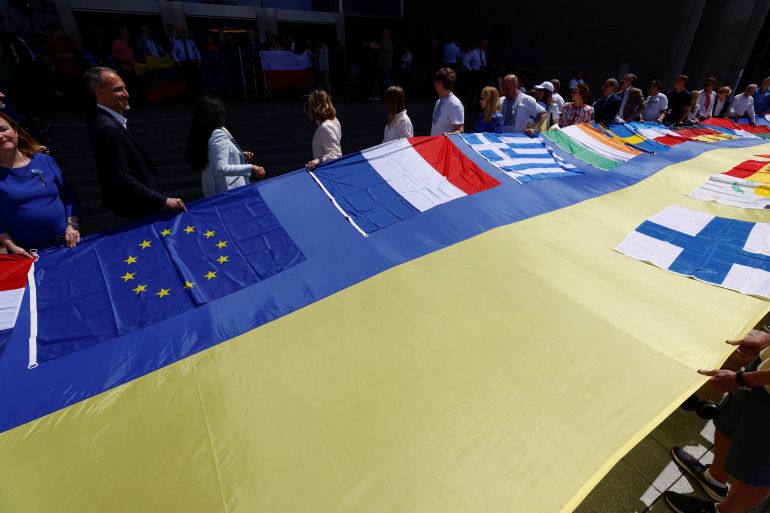‘A good day for Europe’: EU grants Ukraine candidate status
Leaders of the EU’s 27 nations unanimously voted for Ukraine candidate status in a moral victory for the war-torn country.

The European Union agreed to put Ukraine on a path towards EU membership, acting with uncharacteristic speed and unity to pull the embattled country further away from Russia’s influence and bind it more closely to the West.
Meeting at a summit in Brussels on Thursday, leaders of the EU’s 27 nations mustered the required unanimous approval to grant Ukraine candidate status. That sets in motion a membership process that could take years – or even decades.
Recommended Stories
list of 4 items- list 1 of 4Kyiv says US precision artillery systems arrive in Ukraine
- list 2 of 4Why are some nations neutral on the Russia-Ukraine war?
- list 3 of 4Russia may cut off gas completely, Europe must act now, IEA warns
- list 4 of 4EU warns of fossil fuel ‘backsliding’ as countries turn to coal
The move comes just one day short of the four-month anniversary of President Vladimir Putin ordering his troops into Ukraine for what Russia insisted is not a war, but a “special military operation”.
Ukrainian President Volodymyr Zelenskyy tweeted his gratitude and declared: “Ukraine’s future is within the EU.”
Sincerely commend EU leaders’ decision at #EUCO to grant 🇺🇦 a candidate status. It’s a unique and historical moment in 🇺🇦-🇪🇺 relations. Grateful to @CharlesMichel, @vonderleyen and EU leaders for support. Ukraine’s future is within the EU. #EmbraceUkraine https://t.co/o6dJVmTQrn
— Володимир Зеленський (@ZelenskyyUa) June 23, 2022
“Today is a good day for Europe,” European Commission President Ursula von der Leyen said on Twitter.
The EU also gave candidate status to the tiny country of Moldova, another former Soviet republic that borders Ukraine.
Ukraine applied for membership less than a week after Moscow invaded on February 24. Thursday’s decision was unusually rapid for the EU and its go-slow approach to expansion. But the war and Ukraine’s request for fast-track consideration lent urgency to the country’s cause.
To gain EU membership, countries must meet a detailed host of economic and political conditions, including a commitment to the rule of law and other democratic principles. Ukraine will have to curb entrenched government corruption and adopt other reforms.

The European Parliament endorsed Ukraine’s bid hours before the summit started, passing a resolution that called on EU governments to “move without delay” and “live up to their historical responsibility”.
The EU nations have been united in backing Ukraine in its fight against Russia with money and weapons, adopting unprecedented economic sanctions against the Kremlin.
EU candidate status does not give an automatic right to join the bloc and does not provide any immediate security guarantees.
Once a country gains membership, however, it is covered under an EU treaty clause that says if a member falls victim to armed aggression, the other EU countries are obligated to assist it by all the means in their power.
The main benefits of EU membership, though, are economic, since it gives access to a market of 450 million consumers with free movement of labour, goods, services and capital.
‘No objections’
Ukraine has long aspired to join NATO, too, but the military alliance is not about to offer an invitation, in part because of governmental corruption, shortcomings in the country’s defence establishment, and its contested borders.
Before the war, Putin demanded that Ukraine never be allowed to join NATO, which he has condemned for its eastward spread towards Russia’s flank.
But earlier this month, he did not seem bothered by Ukraine’s determination to get closer to the EU, saying it is not a military pact and thus “we have no objections”.
The EU’s leaders also agreed to recognise a “European perspective” for yet another former Soviet republic, Georgia.
European Council President Charles Michel said the EU will be ready to approve its candidate status once “outstanding priorities” are addressed.
Poland’s Prime Minister Mateusz Morawiecki, whose country has been a staunch supporter of Ukraine’s European aspirations for years, said on Twitter: “This is a great moment for Europe’s unity and for the defence of its basic values. The struggle for freedom goes on.”
The membership process can be long and tortuous.
Similarly, several Balkan countries have been seeking without success for many years to join the EU.
Despite waves of crises that have rocked the EU, from migration and the United Kingdom’s exit from the bloc, the union remains popular, with a survey this week showing approval for EU membership is at 15-year high.
Nevertheless, public discontent is mounting over inflation and an energy crisis as Russia tightens gas supplies in response to sanctions, issues for the second day of the summit on Friday.